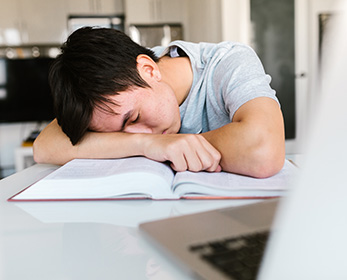How do you make sure you get a good night's sleep?
Friday, 14 March 2025
Insomnia, or not getting a good night's sleep, can have a major impact on your ability to concentrate and study well. What are some tricks to make sure you start each day well rested and refreshed?
“The worst thing in the world is to try to sleep and not to.” author F. Scott Fitzgerald is quoted as saying, and anyone who has struggled to fall asleep knows exactly what he's talking about.
March 14 is World Sleep Day - so its the perfect time to taljk about our sleeping habbits.
Students commonly skimp on sleep during busy periods, like preparing for exams or making sure you get an assignment completed on time.
However, sleeping less while trying to cram means that your body and brain are deprived of essential rest. Your concentration will decrease and memory will be impaired, making it more likely that your academic performance will decline.
Studying from home can also put our body clocks out of sync, we suddenly find ourselves sleeping more during the day, and then find ourselves awake all night.
There are many reasons you might find your sleep is disrupted including increased stress, reduced exposure to sunlight, lack of a routine, as well as mental health concerns like anxiety and depression.
Tips for getting a good night's sleep
The ECU Psychological Counselling Support team have some tips for getting a good night's rest. They suggest the following;
- Organise your bedroom to control light, temperature and noise.
- Maintain a comfortable temperature in the bedroom. Extreme temperatures may disrupt sleep or prevent you from falling asleep.
- Ensure your bedroom is dark enough to sleep, but allows some natural light so your body clock can set itself with night and day. When possible, wake up with the sun, or use very bright lights in the morning. Sleep experts recommend exposure to an hour of morning sunlight for people having problems falling asleep.
- Think about what time of the day you are doing exercise. Being physically tired will help induce sleep. Try to get your exercise at least 5 to 6 hours before going to bed. Avoid exercising within two hours of bedtime as this can energise you and keep you awake.
- Avoid caffeine, alcohol and tobacco in the hours leading up to going to sleep.
- Avoid all of these things at least 6 to 8 hours before sleeping if you want a good night’s sleep.
These and many more suggestions are included in a tip sheet developed by the Psychological Counselling Support team. Download the tip sheet on sleep and checkout others in the series.
You can also make an appointment to chat to a member of the Psycholocial Counselling Support team.
Need some music to help you get to sleep?
Many people find listening to the same piece of music each night helps them establish a routine for going to sleep.
Composer Max Richter wrote an 8-hour opus in 2015 inspired by the neuroscience of sleep. Naturally, it's titled Sleep. You can even get it as a phone App.
